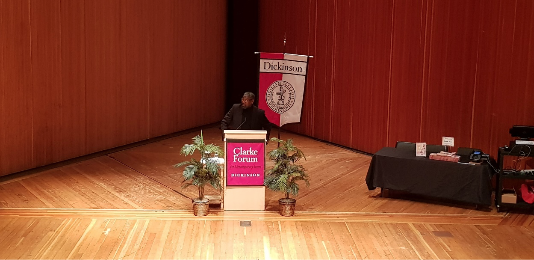Professor Unpacks Queer Black Identity

Dean of the College of Communication and Fine Arts and Professor of Communication and Performance Studies Bryant Alexander from Loyola Marymount University visited Dickinson College to share his personal experience of living at the crossroad of diverse identities as a “black gay man.”
Alexander’s research focuses on autoethnography and performative studies. These two areas work in tandem to assist Alexander in the interpretation of intersectionality and the role it plays for individuals, culture and society as a whole, he explained.
Alexander introduced his talk and defined key terms that capture his attention and imagination like “enfleshment,” “intersectionality,” “performance,” “masculinity,” and “queer.” He explained that the body as an archive in which the interwoven nature of humanity aspects like sex, class and race can be observed. Alexander also explained the “performativity of blackness,” is not necessarily a radicalized idea but a “culturally embodied engagement” through which people can interpret how black people practice culture.
The term “Masculinity” intrigued Alexander because it is a “socially mediated performance of maleness” that encompass all aspects of race, class, power and discrimination. He emphasized that “discussions on gender and masculinity still matter,” due to hypermasculinity generating violence and discrimination against marginalized communities. The idea of “queer,” according to Alexander, refers to the deviance from the socially established norm of gender performance. Alexander explained, “queer” in itself is an intersectionality considering that queer people are often placed in situation where their race, class, and other particularities turn into a matter of discrimination.
Alexander then discussed his personal experiences. He described how his black male identity and his work position as a college administrator comes into conflict. He said that he felt “trapped in this false dichotomy,” and had to moderate his thoughts and behaviors to downplay the stereotype of an “angry or aggressive black man” within the context of his academic life at a predominantly white institution.
Alexander also described a time when he was walking his dog a few blocks away from his institution when he encountered a white woman with her dog. The woman screamed at him and chased him away from her and her dog for no other reason than his skin color. Alexander noted that this incident changed not only his walking route but also him as a person.
The lecture concluded with a picture of his mother and father that reminds him of the man they wanted him to be and to honor his body. Alexander ended the talk with how he maintains his identity, his faith as a member of the queer community, and his circle of friends. He stressed the importance of fully engaging in his intersectionality, to continue practicing his faith and preventing people from misunderstanding his true self.
The Clarke Forum for Contemporary Issues lecture “Queer Intersectionalities: The Communicative Dimensions of Race, Masculinity and Sexuality” was held in ATS on Wednesday, Oct. 30 at 7 p.m.





